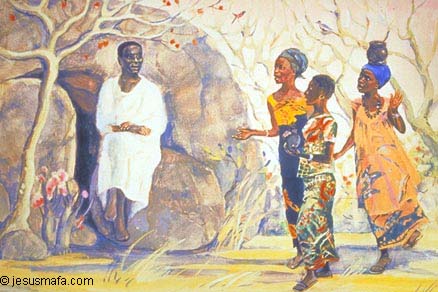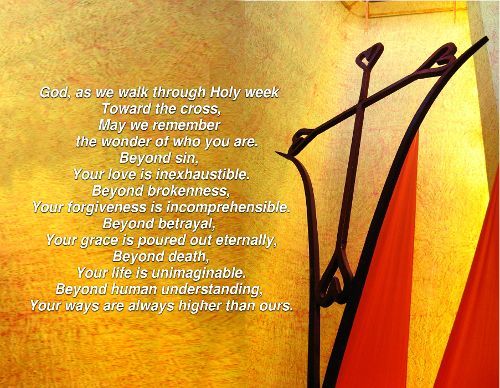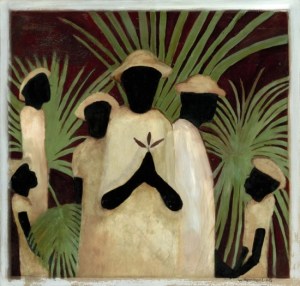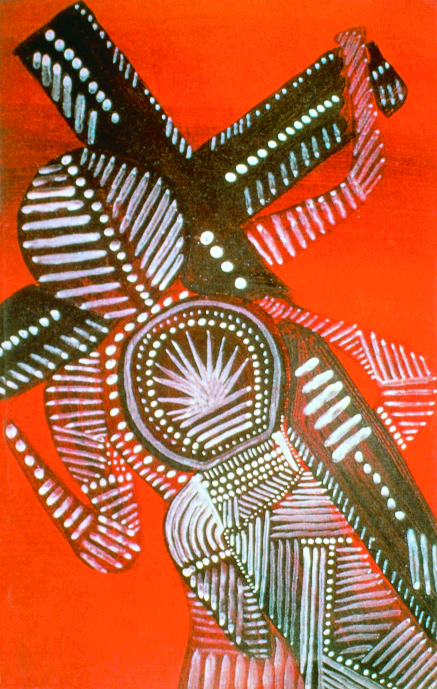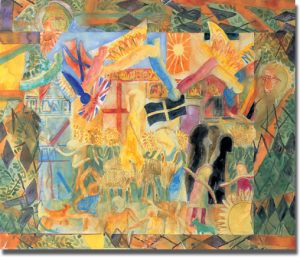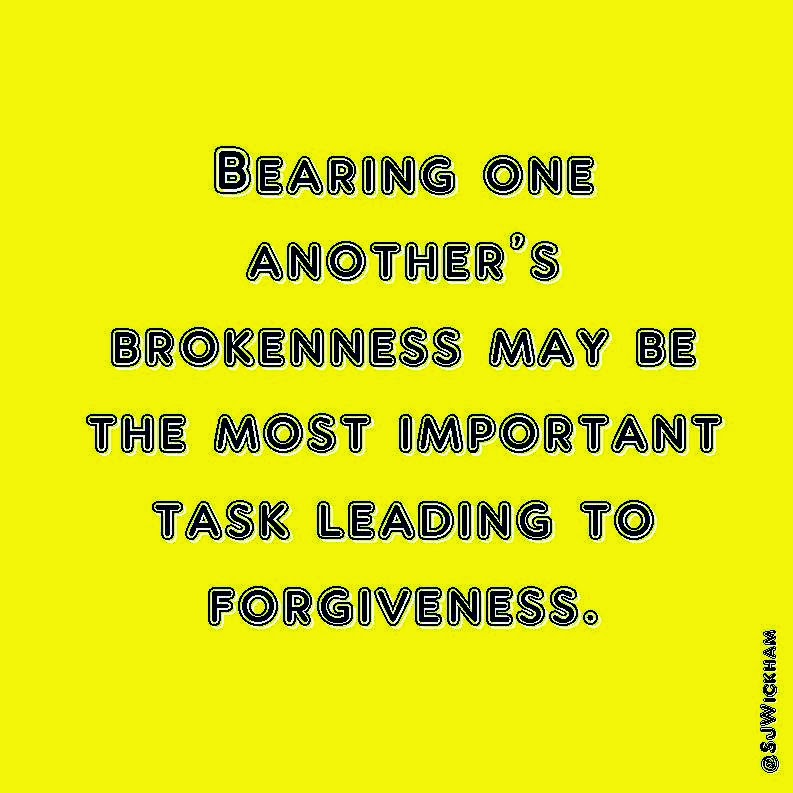Christ is Risen: The world below lies desolate
Christ is Risen: The spirits of evil are fallen
Christ is Risen: The angels of God are rejoicing
Christ is Risen: The tombs of the dead are empty
Christ is Risen indeed from the dead,
the first of the sleepers,
Glory and power are his forever and ever
St. Hippolytus (AD 190-236)
Easter Prayers from Jon Birch at Faith and Worship
Easter resources from Textweek.com
The Easter Vigil explanation and service by Bosco Peters.
Easter Litany from re:worship.
A great collection of resurrection images here
And some music to reflect on:
First from Beneditcitnes of Mary: Easter at Ephesus.
Taize community:
Let nothing disturb you
Let nothing disturb you,
let nothing frighten you,
everything passes,
This is the last in a series of posts on resources for Holy week. Check out the other posts:
This is one of a series of prayer cards published for Lent and Easter. Check out the other cards here
On Sunday evening our family gathered around a small glass jar and mixed soil with ashes and buried wheat berries beneath the humus then doused the mixture with water and processed around the yard then through the corridors of our house singing a song about Jesus entering Jerusalem riding on a donkey, preparing himself to die so that we may live. With good care and a bit of luck, the seeds will sprout by Easter Sunday morning – a visible sign of the necessary death of the seeds to bring life. This was Palm Sunday, Holy Week – a season within the season of Lent to prepare us to celebrate the life that is to come on Easter.
Planting seeds is an act of faith that continues to bring wonder and joy to our children (and even to us adults when we pause to contemplate the wonderful miracle of death transforming to life.) I see other types of seeds planted all around me during this time of year. The Texas flora and fauna are exploding with life after the deadly drought of last year. Parents of young children all around us faithfully and diligently continue to guide their children into abundant life through the hard work of discipline and humility and then watch their children blossom after seasons of temper tantrums and frustration – again and again. All of the prayers and petitions of my grandparents on my behalf throughout the years are a blanket of seeds I wear as a daily cloak. Hours spent listening to lectures and studying and writing and practicing produce new ideas and fabulous papers and sermons by the seminarians all around me here at the Seminary.
As church, where do we collectively plant seeds? For some people, we are good stewards of all of our resources – planting time and treasure and talent into our church communities. Groups of folks pool resources together and make sure children at the local school have some food to take home in their backpacks each day or that medical care is available at a church sponsored free clinic. Maybe churches even combine efforts and transform an entire city, county, state, nation, the world. But seeds are tiny and sometimes we feel our resources are tiny. Sometimes it feels like a bit of a death for us to plant ourselves into a difficult relationship, to really be with someone or to delay or forgo making a financial purchase so that we may plant our resources instead into a community initiative.
Let us not forget that with faith and time and miracle that death is transformed to life, that everything we need to live is within our grasp. Jesus said, “I tell you the truth, unless a kernel of wheat is planted in the soil and dies, it remains alone. But its death will produce many new kernels–a plentiful harvest of new lives.” (John 12:24, New Living Translation)
Bio
Kristin Carroccino lives in Seattle, Washington, with her husband, kids, and a small dog that barks far too often at garbage trucks and the kids’ robotics inventions. This essay is excerpted from the blog her family kept during 2012 at boatswithoutoars.blogspot.com and the forthcoming book Boats Without Oars.
It’s Holy week and Jesus’ journey towards the cross has begun. Many of us have already processed around the church on Palm Sunday, and bought our Easter eggs and hot crossed buns, diverting our attention from the real meaning of Easter to its commercialized version. How many of us are sucked in? What is the focus of your thoughts as we head through Holy week – is it on the life, death and resurrection of Christ or is it on the upcoming Easter egg hunt and whether it will be warm enough to wear your new spring outfit? Most of us know that Palm Sunday commemorates Jesus’ triumphant procession into Jerusalem on donkey’s back, but few of us are aware of the deeper and very subversive implications of this event. And as we walk through holy week towards the cross, Jesus’ actions become more and more subversive. We have in fact entered the most subversive week of Jesus life.
According to Borg and Crossan’s important book The Last Week (2007), it is probable that there were two processions going on into Jerusalem on Palm Sunday – one that symbolized the Roman culture of Jesus day and the other Jesus proclaiming his upside down kingdom.
It would have been customary for Pontius Pilate the Roman governor assigned to Judea and Jerusalem to come with his soldiers to Jerusalem for Passover. His procession would have come from the west at the head of a column of imperial cavalry and soldiers – an impressive and lavish procession specially designed to impress the people to discourage potential uprisings with a visual display of imperial power: cavalry on horses, foot soldiers, leather armor, helmets, weapons, banners, golden eagles mounted on poles, sun glinting on metal and gold.
On the other side of the city, down from the Mount of Olives in the north came Jesus and his humble procession – no pomp, no ceremony, dressed simply like the people, riding on the back of a donkey and followed by his disciples drawn from amongst the peasants and the common people. I imagine the lepers he had healed and the once blind man dancing and rejoicing with him. And there is Lazarus with Mary and Martha a living symbol of the triumph that this procession represents.
Here was the truly triumphant procession and the true rejoicing of the season. Shouts of “Hosanna! Blessed is the one who comes in the name of the Lord!” greeted their passing. But this was a radical procession that really thumbed its nose at the Roman Empire with its power and wealth.
Then Jesus headed to the temple, overturned the tables and threw out the moneylenders proclaiming loud and clear to the religious leaders that their alignment with the power of Rome was totally unacceptable to God. And he caps the week off with a Passover meal, not revealing himself as an emperor messiah his followers and even his disciples were hoping, but washing feet, indelibly imprinting on his disciples this final image of a slave, the last loving act of an upside down king.
This week brought the savage conflict between the kingdom of God and the empire of Rome to a head. Not just a theological statement but a political one as well. Jesus’ belief in the liberating, inclusive, non-violent, peace-seeking kingdom of God was over against the oppressive, greedy, elite-loving, peasant-starving kingdom of Rome. No wonder he was so angry with the Temple hierarchy – the chief priest, the elders and the scribes – who had become servants of the empire and not of the God’s kingdom.
Jesus’ ride into Jerusalem was obviously headed for a collision with the powerful Roman empire – a collision that would cost his life and change history forever. Jesus triumphal entry into Jerusalem may have begun with crowds shouting Hosanna but it ends with Good Friday and the apparent triumph of the powers of the Roman Empire and of Satan. It does not end with a gold crown but with a crown of thorns. Jesus triumphal entry ends with his willingness to take into himself all the pain and suffering of our world so that together we can celebrate the beginning of a new procession on Easter Sunday – a procession that leads us into God’s banquet feast and the wonder of God’s eternal world.
The question for all of us as we walk with Jesus from Palm Sunday to Good Friday is: Where is our allegiance? Are we part of that ragamuffin discipleship band following Jesus, fully aware that we are on a collision course with the values of our secular culture? Do we only want to follow Jesus when we think he promises wealth, power and happiness. Have we so misunderstood him and his purpose that we are ready to turn against him when he turns out not to be who we thought he was?
Perhaps, we’re not part of Jesus’ procession at all. Perhaps we’re standing at the other gate, cheering for the symbols of empire, enthusiastically, supporting our own idea of a messiah, that looks more like the Roman emperor than the humble servant Jesus. Dazzled by power, attracted to wealth, wanting to identify with the victors, not the vanquished, hoping to be counted as one of the elites of our time.
Actually, most of us are probably part of both processions – wanting to follow this Jesus whom we find so attractive yet whom we don’t fully understand, but also caught up in the excitement of Easter egg hunts and spring fashion displays.
The beauty is that Jesus, in his humanity, sees and knows all of us. . . the flawed humanity that surrounds him. . . the flawed humanity of each of us. . . and he sees it and he forgives it, and loves us, and gives his blessing to all of us as he clops along the dusty road toward his confrontation with power, his time of trial, his abandonment, his death.
———————————-
This post is adapted from this one written for Palm Sunday a couple of years ago. You may also like to check out the resources we have posted for Holy week.
Resources for Maundy Thursday:
Resources for Celebrating Holy Week With Kids:
I just came across this beautiful prayer by Joseph Tetlow, author of Making Choices in Christ and Choosing Christ in the World, on the Ignatian Spirituality website. I love breath prayers and this is particularly moving as we move through Holy week. The prayer is a contemporary paraphrase of the Anima Christi. Nothing like anticipation to keep us going.
I choose to breathe the breath of Christ
that makes all life holy.
I choose to live the flesh of Christ
that outlasts sin’s corrosion and decay.
I choose the blood of Christ
along my veins and in my heart
that dizzies me with joy.
I choose the living waters flowing from his side
to wash and clean my own self and the world itself.
I choose the awful agony of Christ
to charge my senseless sorrows with meaning
and to make my pain pregnant with power.
I choose you, good Jesus, you know.
I choose you, good Lord;
count me among the victories
that you have won in bitter woundedness.
Never number me among those alien to you.
Make me safe from all that seeks to destroy me.
Summon me to come to you.
Stand me solid among angels and saints
chanting yes to all you have done,
exulting in all you mean to do forever and ever.
Then for this time, Father of all,
keep me, from the core of my self,
choosing Christ in the world. Amen.
– Joseph Tetlow SJ
Let us enter the city of God today,
Rejoicing with the son of God.
Let us join the throngs of expectant followers,
And shout for joy at Christ’s coming.
Let us walk with Jesus towards the cross,
Longing still for things unseen.
For justice, and mercy and freedom.
Let us stumble along the path Christ walked
Our hearts aching for things not complete,
For wholeness and peace and abundance.
As we breathe in God’s life giving breath
Let us long for what is yet to come.
For a new world of righteousness and truth.
One true God, we move slowly toward your eternal future,
With perseverance and eager anticipation,
Confident that you can orchestrate everything,
To work towards something good and beautiful.
“Put away from you all bitterness and wrath and anger and wrangling and slander, together with all malice, and be kind to one another, tenderhearted, forgiving one another, as God in Christ has forgiven you.”
— Ephesians 4:31-32 (NRSV)
The sins of others,
Those I can see,
That of sisters and brothers,
With brokenness like me.
Sin explains something,
Something gorgeously Divine,
That sin’s just a thing,
To make God’s forgiveness mine.
When I see brokenness in others it reminds me of my own brokenness. We are all so wonderfully fallible. That is the inducement into the very heart of God, a day by day journey.
***
But there is an equivalent reality for the person given to a dark attitude, a disposition of annoyance, and a manner of speech ensuing – “shouting” and “abusive”. Recalling a recent case of road rage enacted on a highway, a 60s male driver in one hell of a rush, there was no convincing him to slow down and take it easy, as he barked and threw his arms about furiously. Something had riled him and his brokenness had taken him into a dark destination manifest to crimes against fellow road users. We could only get out of his way and pray.
There are vast dichotomies of attitude, disposition, and manner of behavior. Ours is to bear one another’s brokenness.
Forgiveness – Understood In Context of Brokenness
The road rage perpetrator couldn’t be reasoned with – but he is still a member of society. When we understand there is a dark source of brokenness within each of us – resonating the need we each have for a holy God to be Lord over our lives – we can wrestle safely with the dark forces engaged within another person. Their brokenness is obvious only because ours is, too.
He needed help. We all do. We should pray all the more that our warm and empathic genuineness might occasionally melt these secondary emotions of anger and rage.
When we reconcile what brokenness is – that the insufficiency and damage of a person’s biology, life experience, and personality explain them – we can grasp God’s sight on matters. Forgiveness is not so hard then. There is an explanation.
Embracing Humanity’s Wonderful Fallibility
What is still so strangely negative – that we are fallen, broken vessels for use – is an astounding encouragement when we recognize what God has done for us in Christ. Our sin propounds God’s grace all the more. It means we are not finished in our sin; that God has had the final, hope-filled word.
As we embrace our own sinful natures, we quicken in embracing the not-so-glorious imperfections of others. Their ugly attitudes and behaviors simply convince us of our ever personal need for a holy God as Lord over all of life.
Bearing one another’s brokenness is a resplendent privilege of each of us who knows the Lord our God. Not only are we commanded to love one another – even in thick of encroaching sin – but we are called to bear these things with a forgiving instinctiveness, as Christ: “Father, forgive them, for they know not what they do!”
And because we are capable of such forgiving instinctiveness we are enabled to do it, upon surrender, and then see it in all its redemptive power. This is when the Holy Spirit’s power comes right into its own, as bonds of hate, fear, and transgression are broken down, block by ugly block.
***
We were saved from engaging in sin to the extent that we might truly marvel at God’s forgiving grace and exemplify it. We still get it wrong, but every broken moment can be redeemed if we wish. Bearing one another’s brokenness may well be the most important task leading to forgiveness.
© 2014 S. J. Wickham.
originally posted at: epitemnein-epitomic.blogspot.com.au
Bio
Steve Wickham is a Baptist Pastor in Perth Australia who holds Degrees in Science, Divinity, and Counseling. His passion is encouraging people to become the best they want to be.
As an Amazon Associate, I receive a small amount for purchases made through appropriate links.
Thank you for supporting Godspace in this way.
When referencing or quoting Godspace Light, please be sure to include the Author (Christine Sine unless otherwise noted), the Title of the article or resource, the Source link where appropriate, and ©Godspacelight.com. Thank you!

